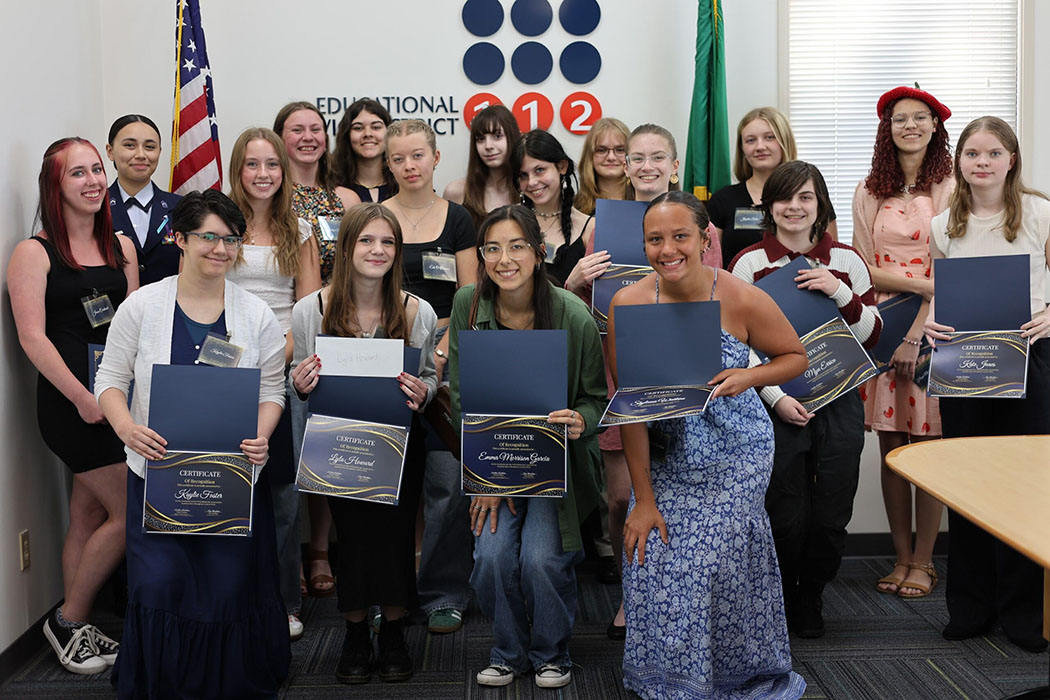Providing support and encouragement for first and second–year teachers.
About
Beginning Educator Support Team (BEST)
The purpose of the Beginning Educator Support Team program is to provide support and encouragement for teachers in their initial years of teaching in order to strengthen their instructional skills and retain competent teachers in the profession.
New teachers are matched with a trained mentor who visits and supports them in the classroom. Release time is provided for mentees and mentors.
Professional development is focused on knowledge and skills for effective teaching and communicating learning. Mentors have opportunities to participate in OSPI mentor training and regional mentor roundtables. Clock hours are offered for all time spent in professional development.

The ESD 112 BEST program provides:
- Resources, coaching, and professional learning opportunities to enhance comprehensive learning systems that foster equitable systems for all learners
- Support, encouragement, and mentoring for first and second-year teachers in order to strengthen their instructional skills and retain competent teachers in the profession
- Release time for mentees and mentors to observe each other
- Teacher and mentor stipends for first-year and second-year teachers to support time for learning conversations outside the typical contract day
How it Works
How BEST Works for Mentors & Mentees
- Meet Weekly
- Observe one-another teaching
- Create a Professional Growth Plan
- Attend free Professional Developments Bi-Monthly with ESD 112
- Mentor Academy with OSPI (Mentors only)
- Mentor Roundtables with OSPI (Mentors only)
- Receive monthly newsletters from ESD 112
Professional Learning
- Available for all participants – see your newsletter for details
- No cost
- Clock hours offered
PD Support
BEST Professional Development Support
This year, the BEST grant provides opportunities for mentors and mentees to meet together in Professional Growth Planning (PGP) sessions and self-evaluate the mentee’s strengths and areas of focus, learn about the Professional Certification Standards and New Teacher Evaluation Criteria, plan professional development opportunities, and network with others around problems of practice.
As part of the mentees’ professional learning, the grant expects mentees to complete a professional growth plan. Mentees are welcome to use templates their district provides or use one provided by BEST and complete the plan on their own or with support from their mentor. The PGPs do not need to be submitted to BEST, but mentees will be expected to complete a reflection on their PGPs at the end of the program before receiving their stipend.

Affinity Group Sessions (2024-25)
Please join us to hear more about Affinity Groups and to begin forming intentions together for the co-creation of these spaces.
Mentors
BEST Mentors
ESD 112 Mentor Resources
Mentor Academies
All Mentor Academies will be run by OSPI virtually.
For new mentors: Mentor Academy 101 – Instructional Mentoring Tools and Skills for Teacher and Student Growth. This is a required training for new mentors. You will develop skills to serve in mentoring and coaching roles.
For returning mentors: Mentor Academy 201 – Taking it Further Mentoring for Growth and Equity. Refine your mentoring skills, build capacity to engage in conversations around equity, and deepen awareness of equitable classroom practices.
Mentor Specialty Opportunities
Mentoring Teachers of Special Education is an optional one-day training focused on mentoring teachers of special education in their three roles-classroom teacher, case manager for students, and lead for adults in their building.
Prerequisite for this academy is prior attendance of Mentor Academy 101.
Mentor Roundtables
Research on professional development indicates that in order to be effective, it must be ongoing. Mentor roundtables provide a regularly scheduled opportunity for mentors to meet with colleagues to share ideas and challenges, practice skill, and to address role-alike issues and concerns.
All Mentor Roundtables will be run by OSPI virtually.
Resources
BEST Resources
Professional Certification Links
For more information about professional certification and the ProTeach Portfolio go to:
OSPI Resources for Beginning Teachers and Mentors
FAQ
FAQ about the BEST Program
Questions?
Each district has identified a key contact for the BEST grant. They are responsible for getting information out to building principals.
District Key Contacts
Battle Ground: Lynnell Murray, murray.lynnell@battlegroundps.org
Camas: Lisa Greseth, lisa.greseth@camas.wednet.edu
Castle Rock: Paulette Johnson, pjohnson@crschools.org
Centerville: Kristin Cameron, kristin@centervilleschool.org
ESD 112 ESA Specialized Student Services: Janelle Tuttle, janelle.tuttle@esd112.org
Glenwood: Bob Rogers, bob.rogers@glenwoodsd.org
Green Mountain: Mark Williams, mark.williams@greenmountainschool.us
Hockinson: Jennifer Sawyer, jennifer.sawyer@hocksd.org
Kalama: Teresa Burns, teresa.burns@kalama.k12.wa.us
Kelso: Laura Hiatt, laura.hiatt@kelsosd.org
Klickitat: Kendrick Lester, kendrick.lester@klickitatsd.org
La Center: Michelle O’Neil, oneil@lacenterschools.org
Longview: Scott Firth, sfirth@longview.k12.wa.us
Lyle: Ann Varkados, ann.varkados@lyleschools.org
Mill A: Kelly Stickel, kelly.stickel@millasd.org
Mt. Pleasant: Cathy Lehmann, cathy.lehmann@mtpleasantschool.org
Naselle-Grays: Lisa Nelson, lnelson@naselleschools.org
Ocean Beach: Amy Huntley, amy.huntley@oceanbeachschools.org
Ridgefield: Chris Griffith, chris.griffith@ridgefieldsd.org
Skamania: Katie Chavarria, kchavarria@skamania.k12.wa.us
Stevenson-Carson: Ingrid Colvard, colvardi@scsd303.org
Toutle Lake: Chris Schumaker, cschumaker@toutlesd.org
Trout Lake: Jerry Lewis, j.lewis@tlschool.net
Wahkiakum: Stephanie Leitz, sleitz@wahksd.k12.wa.us
Washington School for the Blind: Sean McCormick, sean.mccormick@wssb.wa.gov
Washougal: Tracey Maclachlan, tracey.maclachlan@washougalsd.org
White Salmon: Rich Polkinghorn, rich.polkinghorn@whitesalmonschools.org
Wishram: Brent Cameron, brent.cameron@wishramschool.org
Woodland: Malinda Huddleston, huddlesm@woodlandschools.org
last updated 8/29/2024 JR







 ESD 112 equalizes educational opportunities for learning communities through innovative partnerships, responsive leadership, and exceptional programs.
ESD 112 equalizes educational opportunities for learning communities through innovative partnerships, responsive leadership, and exceptional programs.